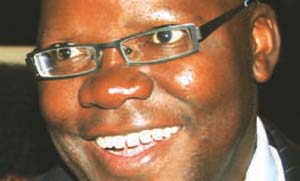Chiyangwa seeks stake in Zisco

The correspondence was copied to the ministries of Industry and Commerce, Youth Development, Indigenisation and Economic Empowerment, Transport and Communications and Mines and Mining Development. The Harare businessman has proposed to partner the winning bidder through his Zimbabwe Stock Exchange listed firm, Zimbabwe Engineering Company, which he said was familiar with Zisco’s operations.
In the letter Mr Chiyangwa pointed out that in light of the integral role Zeco played in the manufacture of steel based machinery and equipment presently installed at Zisco and the need to promote indigenous entrepreneurs it was critical to ensure locals acquire some stake in the firm.
His proposal comes as it emerged that the Minister of Industry and Commerce Prof Welshman Ncube has recommended Mauritius-based firm Essar Energy Holdings Limited to President Mugabe and his partners in the inclusive Government for the acquisition of the Zisco stake.
The Government intends to dispose its 60 percent stake in Zisco to allow a foreign investor to take over and inject significant fresh capital and retire the firm’s multimillion-dollar debt, as part of efforts to revive the firm. In that regard Mr Chiyangwa said in disposing its shareholding the Government should not violate the indigenisation policy and suggested the winner should partner an investor of “strategic positioning” such as Zeco when privatising firms of central importance to the local economy.
More on Chiyangwa
Mr Chiyangwa said Zeco, originally known as the Rhodesian Engineering and Steel Supply Company, played an integral role in the manufacture of heavy industrial infrastructure, equipment and machinery at Zisco, the National Railways of Zimbabwe and Hwange Colliery.
“Zisco is a sovereign company because it is established by an Act of Parliament. Historically when you look at Zisco it was called Rhodesia Iron and Steel Company. Zeco was called RESSCO — Rhodesia Engineering Steel Supply Company; these firms were dependent on each other.
“The investment that went into ensuring that there would be wagons and machinery at the then Risco was proficient and paramount. That goes for Hwange as well as the NRZ’s wagons that were made by Zeco.
“This company, Risco, was a State instrument for purposes of ensuring that when (Ian) Smith declared the UDI he would bust sanctions because he was self-sufficient. He did not need any interventions,” said Mr Chiyangwa.
He said Zisco and Zeco were intertwined and pointed out that it was not sustainable to separate the dormant steel making firm from Zeco, the NRZ and Hwange, as these were critical for the successful revival of Zisco.
Zeco has undertaken extensive engineering work for local and regional firms, including Bindura Nickel Corporation and Shabanie Mashava Mines.
Mr Chiyangwa said Zisco was of strategic and security importance to the economy considering the firm holds all the rights to Zimbabwe’s iron ore reserves meaning selling Zisco to foreigners without the participation of locals was akin to giving away the mineral rights.
As such, he said he was not against foreign investors taking over at Zisco, but suggested this must be done with the participation of local investors.
The eventual investor would be required to come up with a plan to retire the former steel making giant’s US$200 million to US$300 million debt.
Efforts to revive the firm in 2004 were fruitless after Global Steel Holdings of India pulled the plug on a US$400 million deal under unclear circumstances.
At its peak Zisco used to produce between 700 tonnes and 1 million tonnes of steel before financial limitations hamstrung operations a decade ago.












Comments